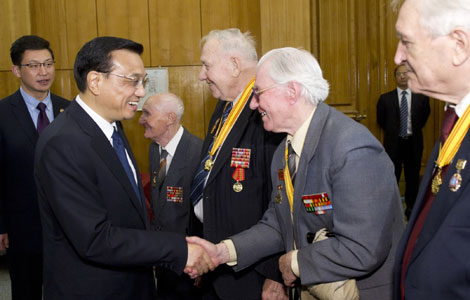 |
|
|
|
|||||||||||
|
 |
|
Vice-Premier Li Keqiang meets World War II veterans in Moscow, Russia, on Saturday. [Photo / Xinhua] |
Vice-Premier Li Keqiang on Sunday called for Chinese and Russian local governments to increase cooperation and investments, an important step to deepen ties in key areas.
Li made the remark when meeting local leaders of the Volga Federal District in the city of Kazan on the last day of his four-day visit to Russia. He will continue to Hungary, Belgium and the European Union headquarters.
Li said active cooperation between the two countries' local governments is an important element in enhancing cooperation, in addition to the efforts made by the central governments.
An attitude of openness is especially important, Li stressed.
China is already Russia's largest trading partner and its second-largest export market.
On Saturday, the two sides signed 27 agreements worth $15 billion, covering energy, equipment, IT and finance.
At the China-Russia Trade and Investment Promotion Forum in Moscow on Saturday, Li named several new areas including high-end equipment, new energy and financial services for cooperation, and urged the two sides to increase bilateral investments.
However, Mikhail Babich, head of the Volga Federal District, noted that the investment environment in Russia is not good enough yet and Russia should make more efforts to improve its investing environment.
The Volga Federal District is the most industrial in Russia, and is known for its auto, rocket, agriculture and oil industries. About 20 percent of Russia's oil is produced in this district.
Vasiliy Bochkaryov, governor of Penza region, one of 83 such regions in Russia, hopes to cooperate with Chinese local governments in wood processing and vegetable production.
Jiang Yikang, Party secretary of Shandong province, suggested setting up regulated and effective communication mechanisms for local cooperation as soon as possible, adding that Shandong province hopes to increase tourism cooperation with Russia.
Valeriy Radaev, governor of the Saratov region, said he hopes to have more foreign investments from China, and hopes to cooperate with China in science and technology.
Two-way investment has rapidly risen in recent years. By the end of 2011, Russia's accumulative investment in China was $818 million, mainly in the fields of manufacturing, construction and transport.
China's investment in Russia was $2.91 billion, mostly in energy, agriculture, forestry, telecommunications, construction and service sectors.
However, bilateral investment was $4 billion, less than 2 percent of the total foreign direct investment of the two nations, which is "still quite small", Li said. "The volume is small but ... the potential is huge."
Zhong Shan, deputy minister of commerce, said on Saturday's forum that the reason for the small number of bilateral investments is lack of a good communication mechanism.
"Our governments should create conditions for the companies to have more communication," he said.
Despite the European debt crisis, China-Russia trade in 2011 surged 42.7 percent on the previous year to $79.25 billion, outperforming the 22.5 percent growth in China's total foreign trade over the same period.
Oil projects
"To push forward gas cooperation, China has proposed a brand new gas model and had received a positive response from the Russian side," Liu Tienan, head of the National Energy Administration, said during his visit to Moscow as part of a delegation led by Vice-Premier Li.
He is confident in finding agreement as companies begin discussions and consultation on the new model.
Liu said the parties have made major technical progress on two gas pipelines but a price has not been agreed on.
Talks between China, the world's fastest-growing energy consumer, and Russia, the world's largest conventional gas producer, stalled late last year.
Yet the two economies remain complimentary, Liu said.
Oil and gas make up more than 20 percent of Russia's GDP, while China depends heavily on oil imports - more than 55 percent of oil consumption - to support its economic growth.
In the past decade, gas consumption in China has climbed from 24.5 billion to 110 billion cubic meters, annual growth of 16.2 percent.
With the rapid progress in industrialization and urbanization, demand is keen for clean energy such as natural gas, Liu said.
Forecasts have shown that demand for natural gas in China will have doubled by 2015, so safe and reliable natural gas pipelines are important for the country, he added.
China has also increased its supplies from Turkmenistan and Uzbekistan.
Earlier on Saturday, Jiang Jiemin, chairman of China National Petroleum Corp, told Xinhua News Agency that the company has signed an agreement with Gazprom.
Under the terms of the deal, which was nearly finalized last year, Russia would sell up to 68 billion cubic meters of pipeline gas per year to China, more gas than it ships to any single European customer.
Contact the writers at [email protected] and [email protected]
Wang Zhuoqiong contributed to this story.